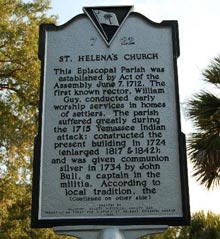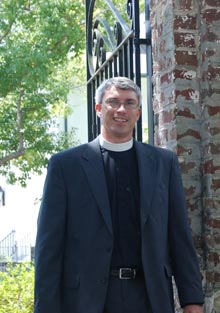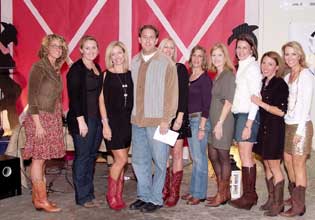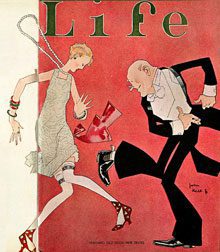 On Sunday, January 22, 2012, the Parish Church of St. Helena opened her Tricentennial celebratory year with a glorious worship service. But, that was just the beginning. Over the course of the coming year, the parish has planned concerts, celebratory events, community outreaches, mission trips, and the opening of Holy Trinity Classical Christian School. As you read some of the history below, I hope that you will learn, as have I, that the founding of a classical Christian school in this area is not something new, but in fact one steeped in our history.
On Sunday, January 22, 2012, the Parish Church of St. Helena opened her Tricentennial celebratory year with a glorious worship service. But, that was just the beginning. Over the course of the coming year, the parish has planned concerts, celebratory events, community outreaches, mission trips, and the opening of Holy Trinity Classical Christian School. As you read some of the history below, I hope that you will learn, as have I, that the founding of a classical Christian school in this area is not something new, but in fact one steeped in our history.
In the Year of Our Lord Seventeen Hundred and Twelve. It is a year with which anyone associated with the Parish Church of St. Helena is certainly familiar. However, I have recently discovered that this year is significant in the Lowcountry not only because it is the year in which the aforementioned church was founded, but 1712 is also the year in which the first Anglican classical school was founded in the Lowcountry. In fact, by the Act of December 12, 1712, the Society for the Propagation of the Gospel in Foreign Parts (a London based Anglican missionary society with quite a name!), provided a stipend for the hiring of a headmaster to start an Anglican school in Charles Town. According to The History of The Parish Church of St. Helena, the headmaster was “required to be a member of the Church of England and capable of teaching Latin and Greek, and catechising the youth in the principles of Christianity as professed by the Church.”[1] And the man hired to found this school? A young assistant at St. Philip’s Church in downtown Charles Town, Rev. William Guy. Headmaster Guy sought to implement a curriculum that was thoroughly classical and Christian. For example, students learned Latin and Greek and read the great classical works, including Homer and Tacitus, in the original languages. Furthermore, on Sundays, Alexander Garden, rector of St. Philip’s, taught the young students Scripture and theology. And so began the first formal school in the Lowcountry. According to Tom Horton, “Though known locally and in London by many names, the Charleston Free School, Saint Philip’s School, Reverend Guy’s School, etc., the Anglican-affiliated foundation is the tap root of all free and private schools in Charleston.” (The Charleston Anglican (Free) School, 1712-c.1777)
William Guy’ s tenure as headmaster of the Charleston Free School was to be short-lived, however. Shortly after he founded the school in Charleston, Rev. William Guy was approached with a new mission. With the permission of the rector of St. Philip’s, members of a newly formed congregation, Beaufort’s own St. Helena’s Parish, invited the Rev. William Guy to come to the “most remote Parish in the country” to serve as their founding rector. After a trip to London where Rev. William Guy received Priest’s Orders, he set about the daunting task of starting a parish where there was neither church building nor house for the minister. Given his background, one can only imagine that along with his desire to establish a church building and a rectory, the young rector had designs on starting a classical Anglican school in the area as well. Alas, we will never know. When the Yemassee War erupted in 1715, Rev. Guy barely managed to escape with his life. In fact, according to his own accounts, Rev. Guy miraculously escaped the area in a very small canoe with four others, eventually making it safely back to Charleston where he became the rector of St. Andrew’s. The construction of an Anglican church building in Beaufort would have to wait until 1724. Meanwhile, it would not be until 1749 that an Anglican Free School would be started in Beaufort upon the death of Rev. Lewis Jones who left a Legacy of £100 Sterling to support such an endeavor.
s tenure as headmaster of the Charleston Free School was to be short-lived, however. Shortly after he founded the school in Charleston, Rev. William Guy was approached with a new mission. With the permission of the rector of St. Philip’s, members of a newly formed congregation, Beaufort’s own St. Helena’s Parish, invited the Rev. William Guy to come to the “most remote Parish in the country” to serve as their founding rector. After a trip to London where Rev. William Guy received Priest’s Orders, he set about the daunting task of starting a parish where there was neither church building nor house for the minister. Given his background, one can only imagine that along with his desire to establish a church building and a rectory, the young rector had designs on starting a classical Anglican school in the area as well. Alas, we will never know. When the Yemassee War erupted in 1715, Rev. Guy barely managed to escape with his life. In fact, according to his own accounts, Rev. Guy miraculously escaped the area in a very small canoe with four others, eventually making it safely back to Charleston where he became the rector of St. Andrew’s. The construction of an Anglican church building in Beaufort would have to wait until 1724. Meanwhile, it would not be until 1749 that an Anglican Free School would be started in Beaufort upon the death of Rev. Lewis Jones who left a Legacy of £100 Sterling to support such an endeavor.
In the Year of Our Lord Two Thousand Twelve. It is a year toward which anyone associated with the Parish Church of St. Helena has eagerly looked. The Lord God has blessed the endeavor of those first parishioners and Rev. William Guy and countless others over the past 300 years. He has allowed this parish to proclaim His Gospel and stand as a beacon of Truth in Beaufort through times of war as well as peace, pestilence as well as prosperity, and famine as well as growth. So this year, we have the opportunity to celebrate the Lord’s faithfulness, provision, and work in the midst of this community over the course of three centuries. Having said that, it is my prayer that the year 2012 will come to be remembered not only as the year that the Parish Church of St. Helena celebrated her Tricentennial, but also as the year in which once again a new classical, Christian school was established in the Lowcountry. May God so bless our endeavors in founding Holy Trinity Classical Christian School that future generations also look back in gratitude at His faithfulness, provision, and work in our community. As for me, I just hope that I don’t need a canoe.
Rev. Chad E. Lawrence is Headmaster of Holy Trinity Classical Christian School.







